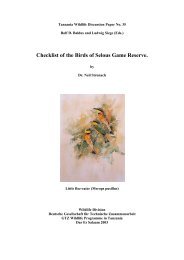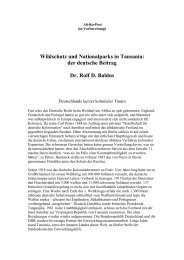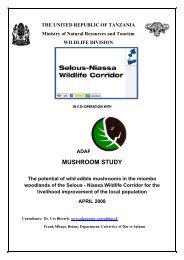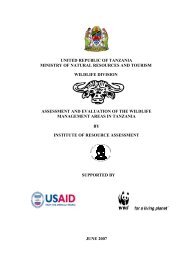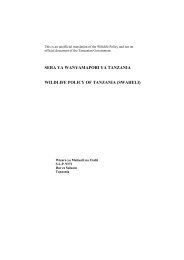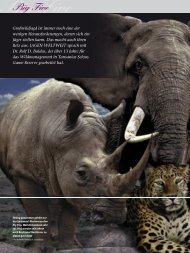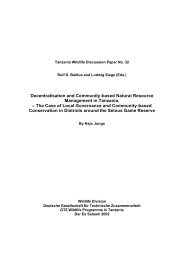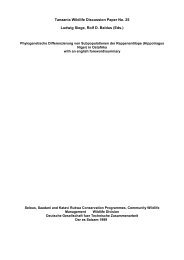African Indaba Articles - wildlife-baldus.com
African Indaba Articles - wildlife-baldus.com
African Indaba Articles - wildlife-baldus.com
You also want an ePaper? Increase the reach of your titles
YUMPU automatically turns print PDFs into web optimized ePapers that Google loves.
Hunting is a controversial topic, one that invariably leads to heated debate whenever discussed. On oneside of the debate, animal rights groups are opposed outright to the killing of animals for sport, and on theother side there are hunters and pragmatic conservationists who view trophy hunting as a means to createfinancial incentives for <strong>wildlife</strong> conservation. Most articles written on the topic are either overwhelmingly for oragainst hunting and are usually written by people with vested interests. Until recently, there has been verylittle scientific assessment of the conservation role of trophy hunting, making objective debate difficult. Mostpeople who appreciate <strong>wildlife</strong> are naturally opposed to hunting, but understanding among the general publicof the pros and cons of hunting as a conservation tool is generally poor. Opposition to hunting is usuallybased on one or all of the following factors. Firstly, people often object to the idea of deriving pleasure fromkilling animals and resent the oft-portrayed image of a Gucci-clad American blasting <strong>wildlife</strong> for fun from a4X4 vehicle. Secondly, people often fail to differentiate between modern day trophy hunting and theunsustainable slaughter of <strong>wildlife</strong> done by early European settlers in Africa. Thirdly, people genuinelystruggle with the paradox posed by hunting: how on earth can killing <strong>wildlife</strong> actually help conserve it?I am a passionate conservationist with a desire to see as much <strong>wildlife</strong> as possible being effectivelyconserved in Africa. Though I have no interest in hunting personally, I am supporter of trophy huntingbecause I see it as playing a vital role in conservation in Africa. Here's why….Firstly, if managed properly, trophy hunting is sustainable. Trophy hunters normally remove around 2-5%of populations of ungulate species which is sustainable as most antelope species have the ability to grow at20-30% per annum. Low off-take rates mean that trophy hunting can even play a role in the conservation ofthreatened and endangered species. When the hunting of white rhinos was legalized for example, thepotential for farmers to make money from sustainable hunting encouraged widespread rhino reintroductionsonto South <strong>African</strong> game ranches, which helped the species to recover from a population size of 50-100individuals to over 11,000 (Leader-Williams. 2005).Secondly, trophy hunting can create vital financial incentives for local people to conserve <strong>wildlife</strong>. Africa'shuman population is growing rapidly and local economy growth is not keeping up. This means that there aremore and more people in Africa reliant on natural resources for survival. These people can not toleratelosses of crops and livestock to <strong>wildlife</strong>, and often rely on bush-meat for protein. As a result, there isincreasing pressure on the remaining <strong>wildlife</strong> populations occurring outside of protected areas and mostspecies are declining in both number and distribution. The only way to halt or reverse this trend is to make<strong>wildlife</strong> valuable to local people: if a wild animal is worth more alive to a small scale farmer than the crops iteats, or than the meat that could be derived from snaring it, then s/he will probably conserve it.One way of making <strong>wildlife</strong> valuable is through ecotourism. Ecotourism is an attractive option because itdoes not involve killing <strong>wildlife</strong>, and appeals to most people – taking only photos and leaving only footprints.The problem is there just aren't enough tourists to go around for all of Africa's national parks, never mind topay for <strong>wildlife</strong> occurring outside of protected areas. Even in South Africa, which receives far more touristsper year than any other <strong>African</strong> country, ecotourism does not generate enough to cover the costs ofprotecting <strong>wildlife</strong> in most national parks. What hope then for countries such as Zambia, Tanzania, andCentral <strong>African</strong> Republic with larger protected area networks and many fewer visitors?Successful ecotourism operations are largely dependent on good infrastructure and political stability whichmeans that relatively few <strong>African</strong> countries can really benefit. This is the crux of the issue: trophy hunting isso important for conservation in Africa because it creates incentives for people to conserve <strong>wildlife</strong> wherealternative options are not viable (Lindsey et al. 2006).Trophy hunting is currently conducted over an area of ~1,400,000 km 2 in sub-Saharan Africa, whichexceeds that en<strong>com</strong>passed by national parks in the region (~1,100,000 km 2 ) (see forth<strong>com</strong>ing article byLindsey, Roulet & Romañach). In South Africa, Namibia and Zimbabwe trophy hunting was the primarystimulus for the conversion of vast areas of livestock land to game ranching, and in Burkina Faso, Cameroon,Central <strong>African</strong> Republic, Niger, Namibia, Tanzania, Zambia, and Zimbabwe, trophy hunting createsincentives for <strong>wildlife</strong> conservation on <strong>com</strong>munally owned land. In Namibia, for example, financial incentivesfrom trophy hunting have contributed significantly to the development of over seven million hectares ofconservancies on <strong>com</strong>munal land (Weaver & Skyer 2003). In Tanzania, revenues from trophy hunting have91



